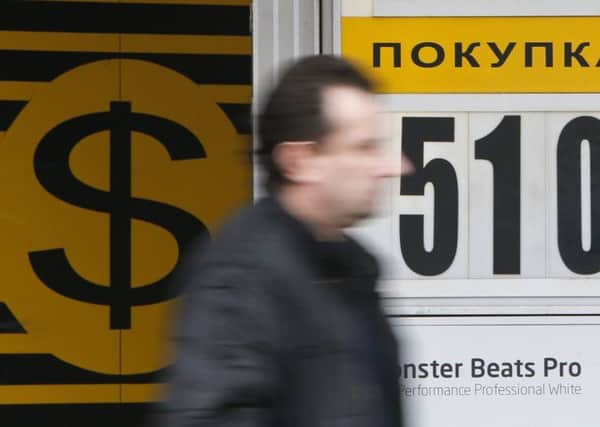Ukraine: Markets sink as intervention feared


Crude oil prices rose by more than $2 a barrel amid concerns of economic sanctions against one of the world’s major energy producers and gold futures jumped 2 per cent as heightened tensions over Ukraine sent investors scrambling for safer havens.
The Dow Jones fell by more than 210 points in early trading and European stock markets saw heavy losses with the German Dax, where many companies have significant exposure to the Russian economy, falling 3.3 per cent for its biggest one-day loss in almost two years. The Italian market lost a similar percentage, with the CAC 40 in Paris also more than 2.5 per cent lower.
Advertisement
Hide AdAdvertisement
Hide AdThe risk-averse stance of markets meant only six FTSE 100 stocks saw gains, as the index fell 101.35 points to close at 6,708.35. Many analysts were predicting further volatility ahead.
Alan Higgins, UK chief investment officer at Coutts, said: “The complex situation in Ukraine brings potential for heightened volatility in the near term amid concerns of an escalation into a wider conflict.” But he added that the bank believes a wider conflict will ultimately be avoided.
David Thebault, head of quantitative sales trading at Global Equities, said: “Investors had under-estimated the risks of an escalation in Ukraine, so the events over the weekend are a wake-up call.”
In Moscow, the Micex market dropped by 12 per cent, wiping the equivalent of $60 billion (£35bn) off the value of its biggest companies.
Gazprom, the state-controlled energy producer with pipes running through Ukraine, lost more than 10 per cent of its value in just a few hours of trading.
Russia’s currency fell to its lowest level ever against the dollar and euro. The central bank spent $10bn of its reserves to prop up the rouble as investors took fright.
Some analysts warned that the situation could push the Russian economy into recession.
Chris Weafer, senior partner at Macro-Advisory consultancy in Moscow, said: “The big problem is that Russia clearly needs to increase inward investment and it needs to keep Russian money in the economy.
Advertisement
Hide AdAdvertisement
Hide Ad“If this crisis continues, so as to make Russia an ‘uninvestible’ country – some sort of pariah state – the money simply won’t come here.”
Much depends on how matters develop in Ukraine, with scenarios ranging from a quick diplomatic settlement to a nightmare military confrontation.
The immediate impact of higher Russian interest rates threatens to kill growth altogether in an economy that grew by just 1.3 per cent in 2013.
However, the chief executive of one of the world’s largest independent financial advisory firms said he expected the markets to “recover quickly”.
Nigel Green, founder and chief executive of deVere Group, said: “I believe that this tumble will be judged by history as a ‘bump in the road’ as markets will recover quickly. I’m not worried that we are about to slump into another global recession.”
He added: “The situation will perhaps fuel some of the concerns regarding emerging markets, although I expect the problems will, in the most part, be limited mainly to Russia and Ukraine.”